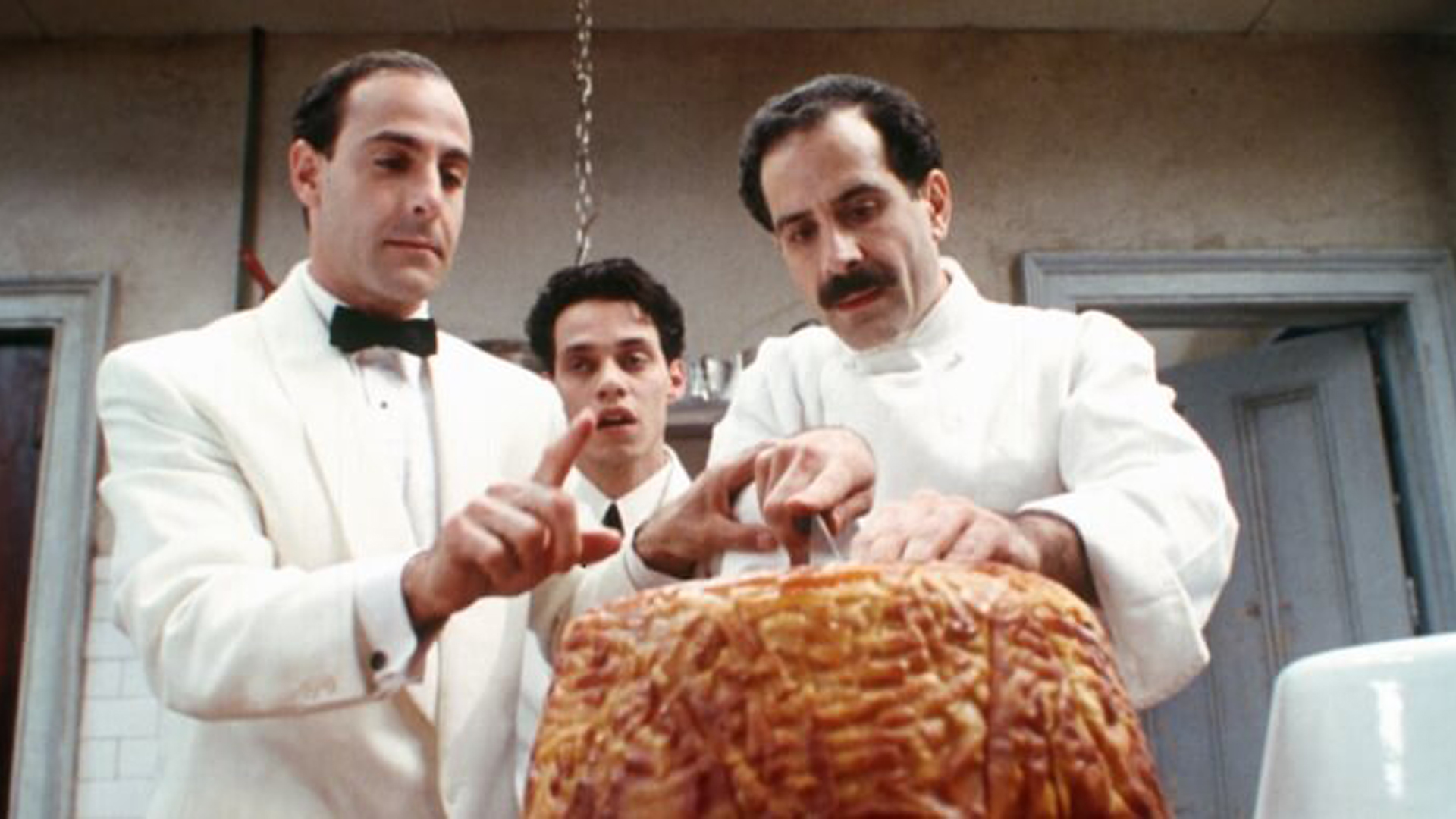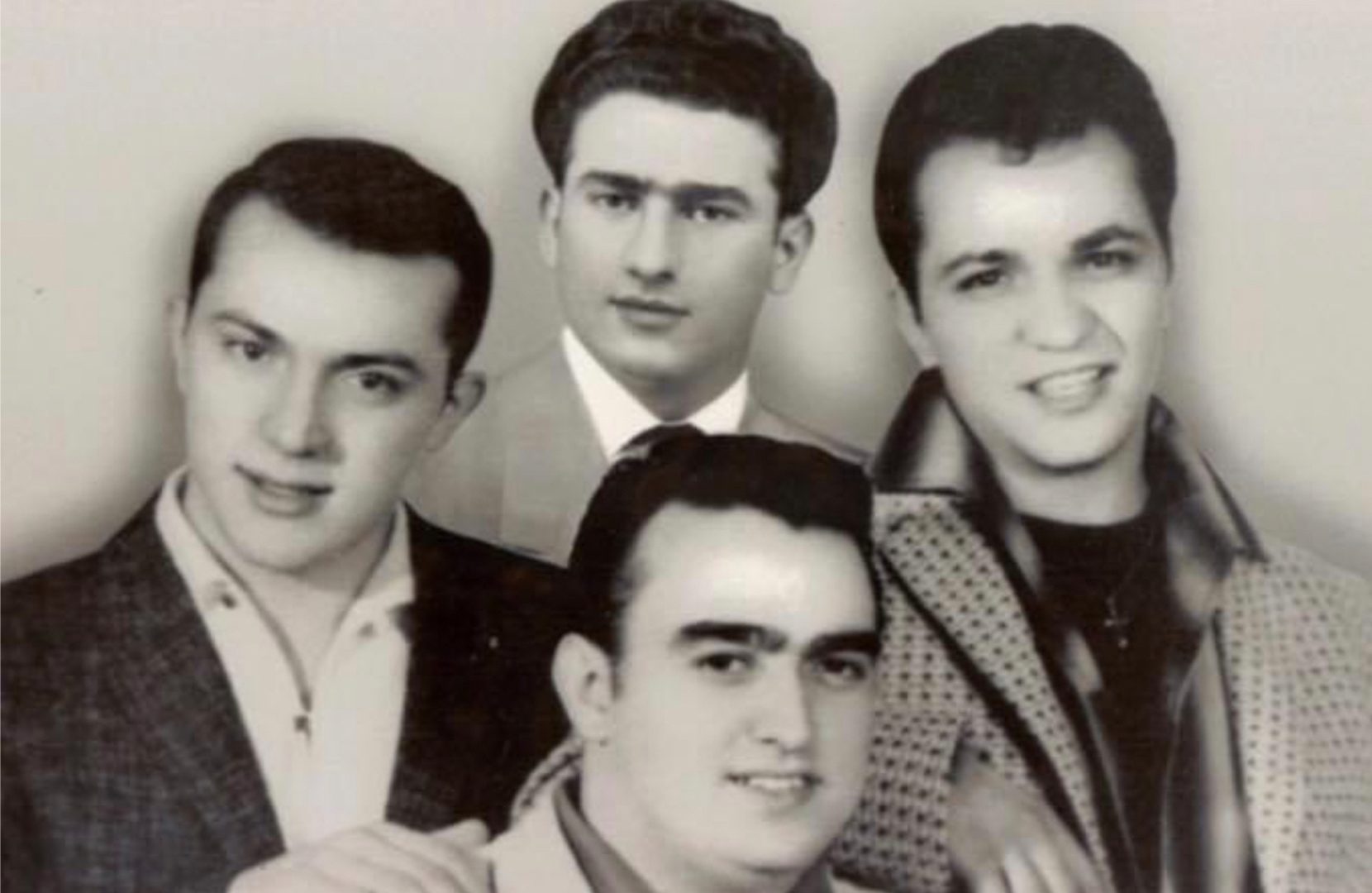Stanley Tucci has been a Hollywood icon for decades. His TV show Searching for Italy sparked a rebirth of allure, interest, and flavor in the acclaimed actor and a showcase of the authenticity he brings to every project. The Stanley Tucci renaissance or what I like to call, “Tuccissance” is spreading around the world like wildfire however, we can’t forget where the actor digs for his inspiration - he is first and foremost a very proud Italian American.
One of Stanley Tucci’s most acclaimed and iconic roles is in the 1996 film, “Big Night”. The movie is based in 1950s New Jersey and centers on the volatile relationship between two Italian immigrant brothers, Primo and Secondo, whose failing Italian restaurant, Paradise, pulls out all the stops for one night that could save their business in honor of famed singer, Louis Prima. The brothers serve timpano (known as timpallo in Italy), which is an epic baked pasta dish that is the movie’s centerpiece. I recently watched this movie with my parents and we found ourselves reflecting on many of the real life situations that come about in this movie that we’re all too familiar with, as a family of Italian immigrants in the restaurant business.
Italian immigrants have a long history with the restaurant business in the United States. Not because they left Italy to pursue their culinary dreams but out of complete necessity and a means to survive. If there is one thing Italians know well it’s food. It’s innately in their blood to make food for your soul. Food is a cornerstone of Italian culture and way of life. In the hands of Italian women and men, food is an expression of family, their surrounding environment and above all, love.
I come from an Italian immigrant family that left the Majella mountains of Abruzzo after World War II ravaged and depleted their home. A long winding journey to different countries and states finally led my Nonno, Nicola, and his brothers to the Central Valley of California, where they ultimately opened DiCicco’s Italian Restaurant in 1956. It did not come without sacrifice. They did not bring financial security with them. They were not chefs. They were not restaurateurs. They were survivors. Their entrepreneurial spirit, tireless work ethic and ability to take advantage of a golden opportunity drove them to achieve success in the United States. My upbringing was immersed with my parents, grandparents and extended family in the restaurant business. I’m a product of growing up among two different immigrant generations, who moved to the United States in search of a better life and being part of the generation that was expected to take advantage of the many opportunities America has to offer.
Achieving the American dream is not for the faint of heart. Not only is leaving your home behind an enormous risk, but it also takes great perseverance to achieve success. My Nonno and his brothers, known in my hometown as the four sons of Italy, reached great heights because they were a unit, stronger together. They learned and embraced what their foreign community wanted and gave it to them in abundance. They made their customers happy even if that meant making red sauce, spaghetti and meatballs instead of regional Italian cuisine. The four sons of Italy created authenticity through their restaurant’s atmosphere and with delicious Italian American food, modified with ingredients that were locally accessible.
What struck me about this movie is how it exists in the real world, where you can go broke trying to sell fantastic entrees while refusing to adapt to your environment. In Big Night, the brothers learned that customers in 1950s America did not go to restaurants for the food, they went for an experience. Primo and Secondo internalized this realization differently - one embraced it and the other rejected it. While their restaurant, Paradise, is empty, the restaurant across the street, owned by another Italian immigrant, is regularly packed with satisfied customers. The character of the Italian immigrant restaurateur, seemingly on top of the world, reminded me of my own grandfather, the man who owned the bustling establishment packed with customers every night. Stanley Tucci’s character quickly learns that customers have to buy into the owners and atmosphere of a restaurant. This is where friction seeps into the cracks of Primo and Secondo’s relationship. The kitchen and dining room were at intellectual odds and when family loyalty is threatened in this kind of environment, it’s difficult to recover. One brother refuses to serve spaghetti and meatballs, demanding to serve Venetian risotto while the other sees they must change their mentality if they want to keep their doors open and be successful. You can recall Stanley Tucci’s character saying, “Give people what they want and later you can give people what you want”.

(Photo Credit: Arianna DiCicco)
The climax of this movie, the creation and presentation of timpano, is incredibly symbolic. It’s the pinpoint in the movie where traditional 1950s food culture starts to evolve. Timpano, a dish that exists all over Italy in different regional variations and often requires days to prepare, became a brilliant cultural symbol for evolving the minds, interest and taste buds of restaurant goers. It introduced an element of authentic and traditional Italian cuisine to a demographic who only knew the red sauce classics, such as spaghetti and meatballs…and they liked it. This evolution and expansion of Italian food in America reminds me of the flourishing growth and development of my own family’s business since 1956, still operating, but at a much higher and advanced level today. It is also a mirror to Stanley Tucci’s career. From Big Night to Searching for Italy, his critical acclaim gave his fans what they wanted and now, he’s sharing what he wants with the world. There is a common thread that has resonated with me from the impact and legacy of Big Night, DiCicco’s Italian Restaurant and Stanley Tucci’s career - authenticity is the key to success.
Arianna DiCicco
Arianna DiCicco is an educator and writer from California, born into an Italian American restaurant family with strong ties to her grandparents’ home in Abruzzo, Italy. She has lived in San Francisco, Rome and New York City where she’s made deep connections within the Italian communities and gained new perspectives about her own culture. With a Masters in International Education, Arianna has a love and passion for learning and educating others about Italian history & culture.


